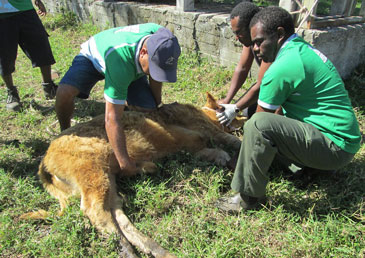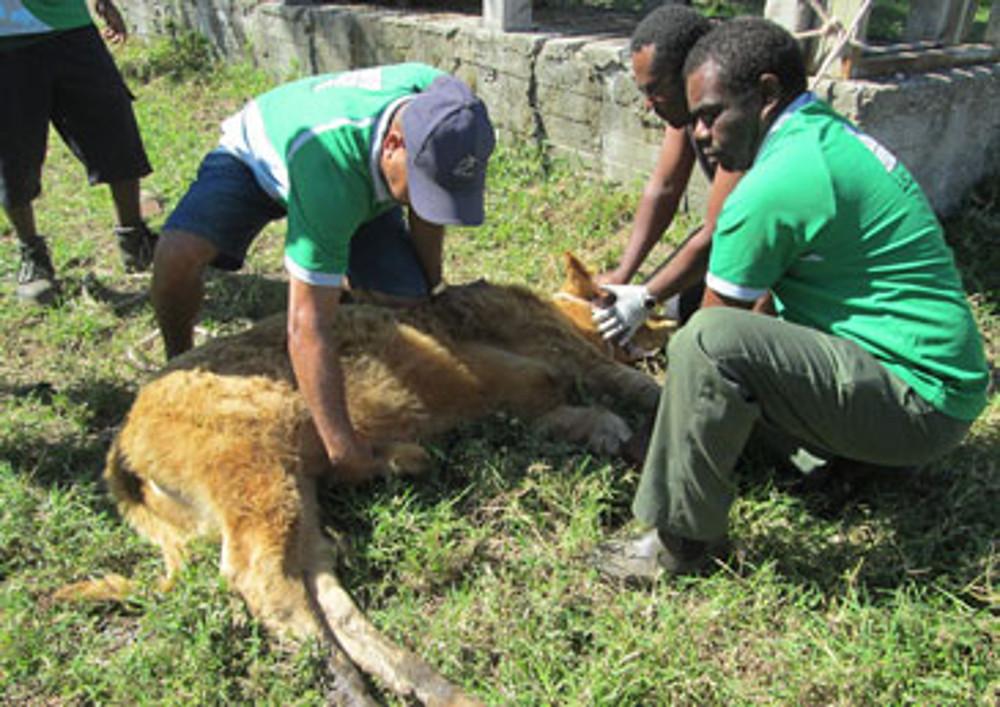 The Vanuatu Animal Disease Emergency Response Plan has been refined and updated to improve the communication and dissemination of information during emergencies.
The Vanuatu Animal Disease Emergency Response Plan has been refined and updated to improve the communication and dissemination of information during emergencies.
This follows the conclusion of a workshop late last month involving participants from the Vanuatu Ministry of Agriculture, Livestock, Fisheries, Forestry and Biosecurity (MALFFB) at the Vanuatu Agriculture College in Santo.
The workshop was facilitated by the Pacific Community (SPC) in partnership with MALFFB and the Vanuatu Agriculture College.
Animal health is a major issue that needs to be closely monitored in the Pacific as this affects farmers’ livelihoods, human health and national economies.
Livestock contributes significantly to Vanuatu’s economy and cultural life as Vanuatu is the only Pacific island country that currently exports beef to nations such as Japan, Solomon Islands and Papua New Guinea. Santo accounts for 40 to 60 percent of the nation’s total beef exports, and in 2014, Santo operations exported a total of 265 metric tonnes of beef.
After the Vanuatu Laefstock Disease Emergency Response plan was reviewed, the 30 participants, including five women, participated in a desktop drill to familiarise themselves with command and control structures and practices, and reporting channels when responding in a timely manner to any incursions of serious exotic diseases or animal pests that may enter the country.
The emergency response workshop followed the launch of a 16-week distance learning para-veterinary training course, also supported by SPC through its Land Resources Division.
With a lack of qualified veterinarians in the region, 22 MALFFB livestock officers attended the para-vet training launch and orientation sessions.
These livestock officers from Torba, Penama, Sanma, Malampa, Shefa and Tafea provinces, are involved in biosecurity, and animal health and production services, and are the first points of contact for farmers needing assistance.
The course, developed by SPC, is composed of 12 units, covering all aspects of animal health, animal production, zoonosis and biosecurity. The trainees are required to undertake theory and tutorial sessions as well as field activities.
Veterinarians and senior livestock officers, who are para-vets themselves, are assigned the role of local tutors and are tasked with the day-to-day running of the training at their respective localities or duty stations.
A summer school session will be held at the end of the course, when the trainees take part in practical sessions – for example, clinical manipulations and handling of locally-available animals including sheep, pigs and cattle – and theory revision.
For competency assessment purposes, the course consists of three assignments and a one week summer school at the end of the 16-week course, during which trainees are assessed for their practical skills by SPC and local vets. Final assessment comprises an oral and practical exam and a written exam, at the end of the week.
Media contacts:
Lonny Bong, Director, Department of Livestock, Port Vila, Vanuatu ( [email protected]) + 678 7710062 / 5388083
Tekon Timothy Tumukon, Director, Biosecurity Vanuatu, Port Vila, Vanuatu ( [email protected]) + 678 23519 / 678 33580
Dr. Israel Wore, Senior Veterinary Officer (North), Biosecurity Vanuatu, Luganville, Santo, Vanuatu ( [email protected]) +678 7104316
Elenoa Salele, SPC Animal Health and Production Information Assistant ( [email protected]) +679 7329647
Dr Ilagi Puana, SPC Animal Health and Production Adviser ( [email protected] ) +679 8619093
